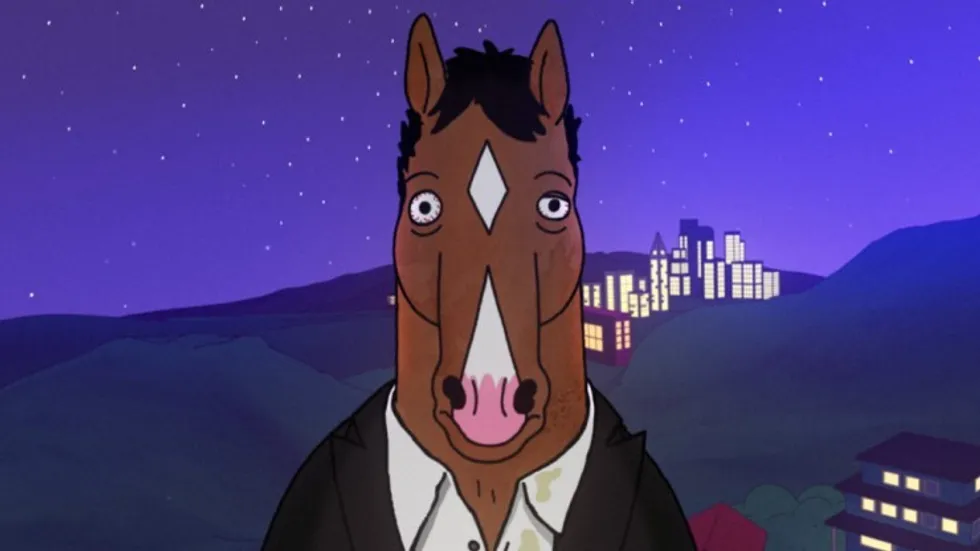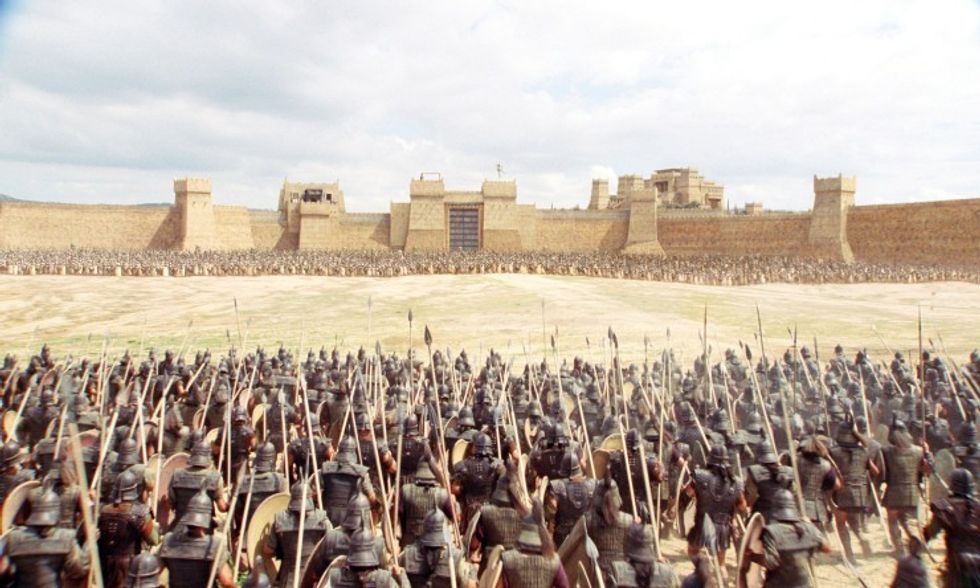
When you speak, do you ever use exaggeration to get your point across? Chances are, you use an exaggeration literary device known as “hyperbolic language” every day of your life, but you may not have been aware. Hyperbole is one of a writer’s most useful tools.
Language and the way we say things matter.
As filmmakers, hyperbole can help us get complex ideas, situations, and characters across to the audience. But what is hyperbole? Today, we’re going to define it by looking at hyperbole examples in literature, poetry, film, and television.
Ready?
Let’s take off like a rocket and stuff our brains with information until they spill out our ears.
Hyperbole: The Greatest Literary Device
www.youtube.com
How do We Define Hyperbole?
While traditionally we’ve seen hyperbole used in poetry, literature, and other classical writing, I think filmmakers can utilize this language in many different ways. Posts like this are meant to help open you up to new ways of thinking and possibilities within your language and skillset.
Define Heyperbole
A hyperbole is an extreme exaggeration that is not meant to be taken literally but has some inherent truth.
For example, “I’m so hungry I could eat a horse” is an outrageous statement, but there is truth to the person’s massive hunger.
 ‘BoJack Horseman’
‘BoJack Horseman’
Credit: Netflix
How to Pronounce “Hyperbole”
The word begins with the prefix hyper-, but instead of having the emphasis on the first syllable—HYE—it has the accent on the second syllable.
To break it down phonetically, “hai·PUR·buh·lee.”
What Does “Hyperbolic” Mean?
A conjugate of hyperbole, hyperbolic means “language that exaggerates or overstates the truth.”
Define The Hyperbole Purpose
Why do writers use hyperbole? Sometimes, you want to communicate emphasis or a specific effect. To do so, you might use exaggerated language to get a specific emotion out of your audience. Hyperbole emphasizes ordinary human emotions in a way that makes them extraordinary. You can better grab the reader’s attention.
This is commonly seen in comedy to create a humorous reaction. But it can be used to gross people out, frighten them, or even make them excited.
There are many other uses. You can even direct a scene and talk to an actor using hyperbole to help them tap into the extreme emotion in the scene.
Other Reasons to Use Hyperbole:
- Emphasize a point
- Contrast two ideas
- Grab attention
- Set the scene
- Spice up bland description
 The idea of “fake news” is a hyperbolic one! Even in ‘Citizen Kane.’
The idea of “fake news” is a hyperbolic one! Even in ‘Citizen Kane.’
Credit: Warner Bros.
5 Examples of Hyperbole
To understand this literary term, let’s go over specific examples to see how hyperbole is used by writers across different canvases.
1. Hyperbole Examples in Poetry
The hyperbole poetry definition is the same as everywhere else. It’s exaggerated language. That makes sense when it comes to poetry, where writers are using abstract ideas to tell us stories and be evocative. One of my favorite examples of hyperbole in a poem is in The Iliad, where Homer says the god Mars cried out “as loudly as nine or ten thousand men.” I do not consider this idea literal even for a god.
Another example I learned from my late English professor Dr. Arnold Markley is from Andrew Marvell. He was a 17th-century metaphysical poet that used hyperbole in “To His Coy Mistress.” His words prove how much he cares about the and what an impact she has on his life:
“A hundred years should go to praise
Thine eyes and on thy forehead gaze;
Two hundred to adore each breast;
But thirty thousand to the rest.”
 ‘Troy’
‘Troy’
Credit: Paramount Pictures
2. Hyperbole Examples for Kids
I often find myself teaching literary devices to kids through the Young Storytellers program in Los Angeles. (Please donate, we could use the help!)
When teaching kids hyperbole, it’s best to keep it simple. Start with some of these very common examples and build from there.
Examples of Hyperbole for Kids:
- She’s as thin as a toothpick.
- Her brain is the size of a pea.
- He was skinny enough to jump through a keyhole.
- That mall is large enough to have its own zip code.
 ‘Inside Out’
‘Inside Out’
Credit: Pixar
3. Example of Hyperbole in Literature
So, what is hyperbole in literature? Again, it’s the same as it is everywhere else. Authors and novelists use this technique to get a rise out of readers. We find ourselves understanding deep emotions and often chuckling at humorous excerpts.
One of my favorite literary examples of hyperbole comes from the American folktale “Babe the Blue Ox.” To understand just how cold the weather was in Minnesota, the author uses hyperbole.
“Well now, one winter it was so cold that all the geese flew backward and all the fish moved south and even the snow turned blue. Late at night, it got so frigid that all spoken words froze solid afore they could be heard.”
There’s a certain folksy way about hyperbole, like listening to someone from the American South tell a tall tale.
One of the greatest writers ever, Mark Twain, was known to use hyperbole to explain emotions. He writes about helplessness in Old Times on the Mississippi. Twain says:
“I was helpless. I did not know what in the world to do. I was quaking from head to foot, and could have hung my hat on my eyes, they stuck out so far.”
 ‘Bunyon and Babe’
‘Bunyon and Babe’
Credit: Toonz Media Group
4. Examples of a Hyperbolic Sentence
Of course, we encounter hyperbole in everyday life all the time. I bet you hear a hyperbolic sentence every day. (That might even be one!)
Let’s take a look at some of the common ones I think we have all encountered over the years.
- I’m so hungry I could eat a horse.
- He’s as old as the hills.
- I walked a million miles today.
- She can hear a pin drop a mile away.
- I died of embarrassment.
- He’s as skinny as a toothpick.
- She’s as tall as a beanpole.
- It’s raining cats and dogs.
- Its brain’s the size of a pea.
- New York is the city that never sleeps.
- I have a ton of things to do.
- That runner’s faster than the speed of lightning.
- My parents are going to kill me.
- That was the easiest test in the world.
- I’m dying of starvation.
- That movie went on forever.
- Our car cost us an arm and a leg.
- It’s so hot you could fry an egg on the sidewalk.
- She was so mad she was spitting bullets.
- She’s so sweet you could get a cavity.
- I was so ashamed, the earth swallowed me up.
- I’m so excited, I could die!
- I’ve told you a million times!
- She knocked it out of the park.
- He has the memory of an elephant.
- He’s high as a kite.
- That book is a real doorstopper.
- It took forever to find you.
- I had to walk to the ends of the Earth!
- I can’t live without you.
- I’m thirsty as a camel.
- I got my English test back and it was dipped in blood.
- I love you to the moon and back.
- She walks as slow as a tortoise.
- It’s a jungle out there.
- I haven’t seen them in ages.
- I thought that lecture would never end.
- It’s been raining for 40 days and 40 nights.
- She eats like a bird.
- That turkey could feed an army!
- He runs like the wind!
- It’s the worst day of my entire life!
- I’ve seen that movie a thousand times.
- This alcohol-free town is dry as a desert.
- We’re never gonna get there!
- I’m drowning in work.
- He talks a mile a minute.
- I’m so tired I could sleep for a million years.
- It’s all fake news!
- The whole world is going to hell in a handbasket.
 ‘The Office’
‘The Office’
Credit: NBC
5. Hyperbole Figurative Language Examples in Film and TV
If hyperbole has existed in other art forms for centuries, you better believe it made its way to film and television over the last 100 years. We’ve seen examples in dialogue, with Toy Story‘s Buzz Lightyear uttering, “To infinity, and beyond!” And we’ve heard the iconic line from The Sandlot, “You’re killing me, Smalls!”
But here’s a story from my own life that involves hyperbole.
Back in 2014, I was working with Mickey Rourke on a screenplay for a movie called The Welshman. It was an amazing true story about a rugby player who is forced out of the closet by a French tabloid a few weeks before playing in the championship game. The script was emotional and beautiful. If we had made that movie, I have no doubt Mickey would have won his Oscar.
Anyway, in one scene, a character was meant to have sex. And Mickey thought the sex was too vanilla. We were working on describing it on the page, and he told me I should write, “The sex is rough, like if a shark fucked a tuna.” Now I’m not sure what nature shows he’s been watching, but that hyperbolic statement has stayed with me forever.
The movie was never made. It’s a shame.
 ‘The Wrestler’
‘The Wrestler’
Credit: Fox Searchlight
Define Hyperbole in Film and TV
Hyperbole in Film and TV refers to the exaggerated representation of a character, situation, or element to create a dramatic or comedic effect.
Just as hyperbole in literature involves using extreme exaggeration to make a point or to emphasize something, its counterpart in visual media serves a similar purpose: to engage the audience, emphasize an emotion, or create a memorable scene.
Several uses of hyperbole in Film and TV include:
- Character Traits: A character may be portrayed with exaggerated features or personality traits to underscore a particular aspect of their nature. For example, a super-villain might be depicted as extraordinarily evil or powerful to intensify their threat.
- Situations/Scenes: Situations can be exaggerated for comedic or dramatic effects. A small misunderstanding might lead to an over-the-top comedic sequence, or a character might have an extremely overblown reaction to a relatively minor event to heighten the drama or comedy.
- Settings and World-Building: The setting or world of a movie or TV show might be portrayed in a hyperbolic manner to create a distinctive atmosphere. For instance, a dystopian future might be depicted as extremely bleak and exaggerated to make a point about societal issues.
- Special Effects: Sometimes, special effects are used in a hyperbolic way, with over-the-top explosions, superhuman feats, or supernatural occurrences to wow the audience or emphasize the magnitude of a particular event.
- Dialogue: Characters might use hyperbolic language to express their emotions or describe situations. Phrases like “the worst day of my life” or “I could eat a horse” are examples of exaggerated speech.
Summing Up “What Is Hyperbole?” (Definition and Examples)
Hopefully, you have a firm grasp of what hyperbole is used for in literature, poetry, film, and television. The next time you sit down to write something or even to direct, consider using hyperbole to get your point across.
What are some of your favorite uses of hyperbole? Let us know in the comments.
Author: Jason Hellerman
This article comes from No Film School and can be read on the original site.
